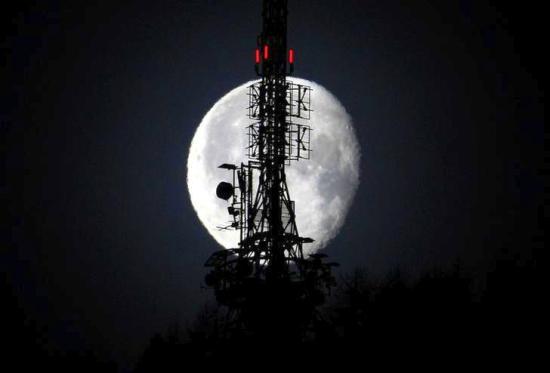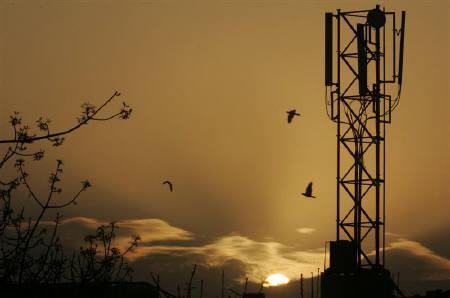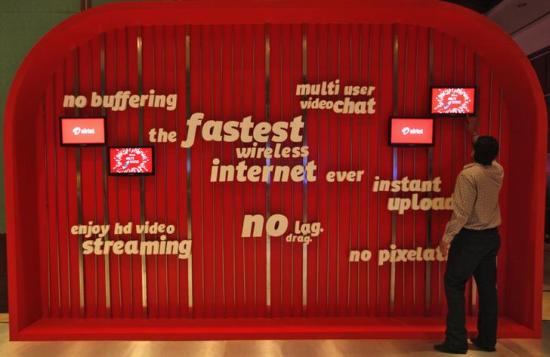
Inconsistencies in policy have turned the Indian telecom industry into a case study of the damage caused by poor regulation.
The sector has suffered controversy on account of 2G licences, differential treatment of CDMA and GSM technologies, intra-circle 3G roaming, changing joint venture norms for foreign direct investors, and so on.
Now, changes in the Broadband Wireless Access (BWA) policy may create fresh issues.
The Telecom Commission recently cleared the offering of voice services via Voice over Internet Protocol (VoIP) by BWA spectrum-holders, provided they buy a unified licence.
The department of telecommunications is also mulling the modalities of BWA providers switching from the 2,300 megahertz (MHz) band to the 700 MHz band.
If it happens, the price paid for 2,300 MHz in the 2010 auctions will be adjusted against the price discovered for 700 MHz in auctions scheduled for 2014-15.
Both changes have disturbing implications. Some 32 months after BWA auctions, only Airtel has rolled out its BWA service.
Others like Reliance Jio Infotel, Tikona Digital, Aircel and Augere, who have not met BWA rollout obligations, may decide to wait further for clarifications.
Delays would further retard the development of a high-speed data network in India, leaving the country two generations behind the curve.
...

The strong positive externalities of high-speed networks imply that such delays will also have large macro-economic opportunity costs. Of course, allowing voice on internet is in itself, a good thing.
The ban was conceived to protect PSU monopolies and it should not have been imposed, or dispensed with long ago.
However, non-transparent, retrospective changes in terms leads to suspicions of favouritism, particularly when those BWA spectrum-holders who fail to roll out the service are seen to be benefitting from accessing a more efficient band, instead of being slapped with a penalty.
Reliance Jio Infotel is the only player with BWA spectrum across all 22 circles.
At the 2010 BWA auction of 2,300 MHz spectrum for 4G/LTE (Long-Term Evolution) data services, new bidders had to opt for either an internet service provider (ISP) licence for Rs 30 lakh (Rs 3 million), or a unified access licence costing much more - Rs 1,658 crore (Rs 16.58 billion).
VoIP services were banned, even on unified licences. All the new entrants opted for ISP licences, while unified licence-holders bid selectively.
However, India is a voice-driven market. Pure internet data (excluding text messages and ringtones) contribute only 6 per cent to mobile revenues, while voice contributes 85 per cent.
BWA spectrum sold at Rs 642 crore (Rs 6.42 billion) per MHz.
...

In contrast, 3G spectrum (voice+data) cost Rs 1,675 crore (Rs 16.75 billion) per MHz and the reserve price for 2G (voice+data) spectrum in November 2012 auctions was Rs 2,800 crore (Rs 28 billion) per MHz.
Crucially, if VoIP was known to be on the cards, BWA bidding would have gone much higher. There is another inconsistency.
The New Telecom Policy, 2012 sets the unified licence fee at Rs 30 crore (Rs 300 million), so charging Rs 1,658 crore (Rs 16.58 billion) under the old policy terms may now be debatable.
In technical terms, 700 MHz is more efficient than 2,300 MHz, meaning that less capital expenditure is required for rollout at 700 MHz. Hence, 700 MHz is standard for BWA services across Asia-Pacific and Latin America.
However, capex savings are offset if 700 MHz spectrum is much more expensive than 2,300 MHz spectrum. The regulator recommends a 700 MHz reserve price at over five times the 2,300 GHz price, making it prohibitively expensive.
On the other hand, if 700 MHz spectrum was offered cheap, the government would lose.
Ideally, telecom policy should be technology-neutral with unified licences that leave operators free to decide what services they offer.
Flip-flops and repeated post-facto policy changes have already vitiated what used to be the world's fastest-growing market. The proposed changes in BWA terms could be yet another adverse development.